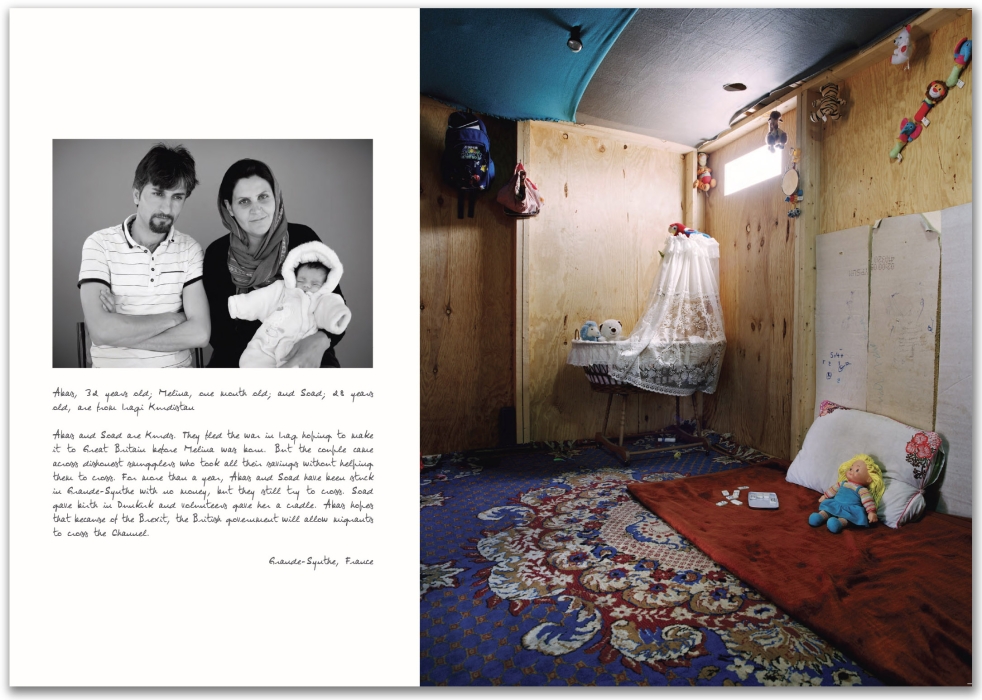
Abas, 32 years old; Melina, one month old; and Soad; 28 years old, are from Iraqi Kurdistan.
Abas and Soad are Kurds. They fled the war in Iraq hoping to make it to Great Britain before Melina was born. But the couple came across dishonest smugglers who took all their savings without helping them to cross. For more than a year, Abas and Soad have been stuck in Grande-Synthe with no money, but they still try to cross. Soad gave birth in Dunkirk and volunteers gave her a cradle. Abas hopes that because of the Brexit, the British government will allow migrants to cross the Channel.
Grande-Synthe, France

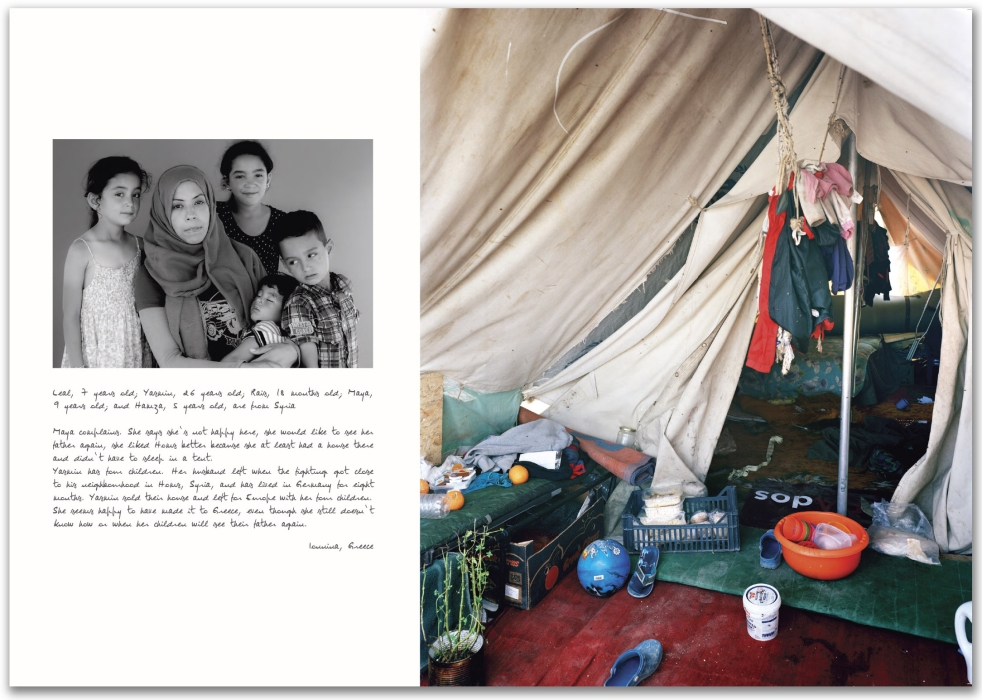
Leal, 7 years old; Yasmin, 26 years old; Rais, 18 months old; Maya, 9 years old; and Hamza, 5 years old, are from Syria.
Maya says she’s not happy here, she would like to see her father. She liked Homs better because she at least had a house there and didn’t have to sleep in a tent. Yasmin has four children. Her husband left when the fighting got close to his neighbourhood in Homs, Syria, and has lived in Germany for eight months. Yasmin sold their house and left for Europe with her four children. She seems happy to have made it to Greece, even though she still doesn’t know how or when her children will see their father again. Ionnina, Greece
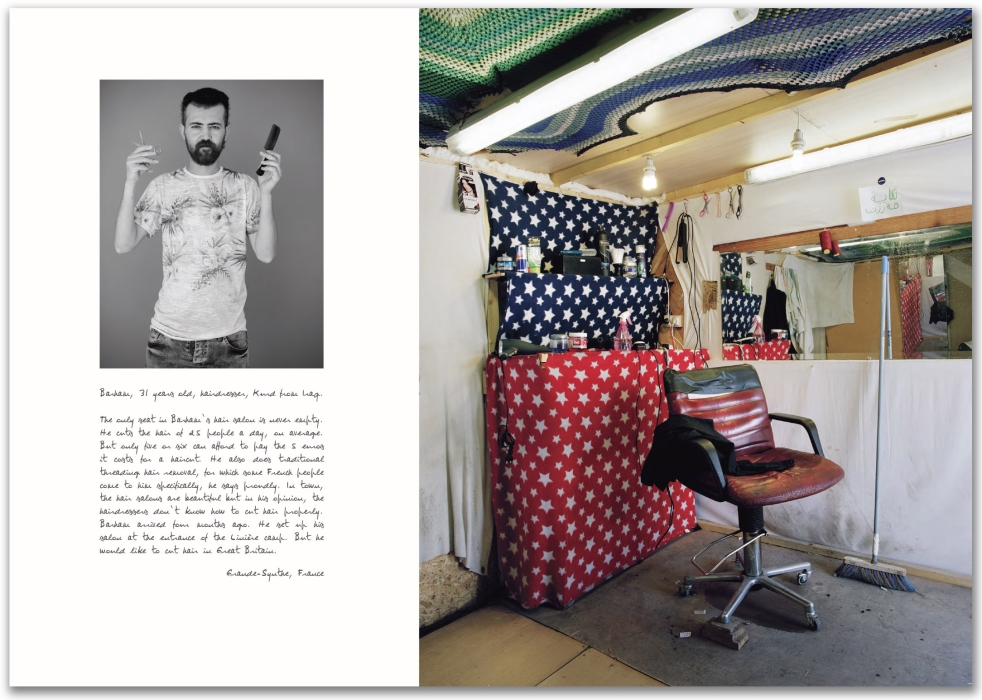
Barham, 31 years old, hairdresser, Kurd from Iraq.
The only seat in Barham’s hair salon is never empty. He cuts the hair of 25 people a day, on average. But only five or six can afford to pay the 5 euros it costs for a haircut. He also does traditional threading hair removal, for which some French people come to him specifically, he says proudly. In town, the hair salons are beautiful but in his opinion, the hairdressers don’t know how to cut hair properly. Barham arrived four months ago. He set up his salon at the entrance of the Linière camp. But he would like to cut hair in Great Britain.
Grande-Synthe, France
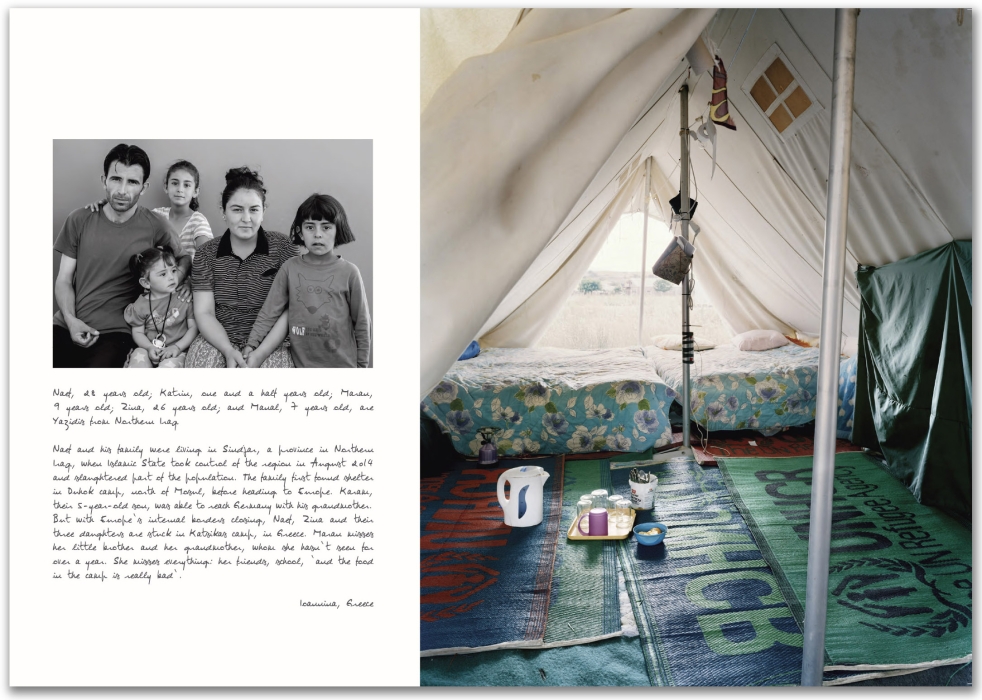
Naef, 28 years old; Katrin, one and a half years old; Maran, 9 years old; Zina, 26 years old; and Manal, 7 years old, are Yazidis from Northern Iraq.
Naef and his family were living in Sindjar, a province in Northern Iraq, when Islamic State took control of the region in August 2014 and slaughtered part of the population. The family first found shelter in Duhok camp, north of Mosul, before heading to Europe. Karam, their 5-year-old son, was able to reach Germany with his grandmother. But with Europe’s internal borders closing, Naef, Zina and their three daughters are stuck in Katsikas camp, in Greece. Maran misses her little brother and her grandmother, whom she hasn’t seen for over a year. She misses everything: her friends, school, “and the food in the camp is really bad”.
Ioannina, Greece
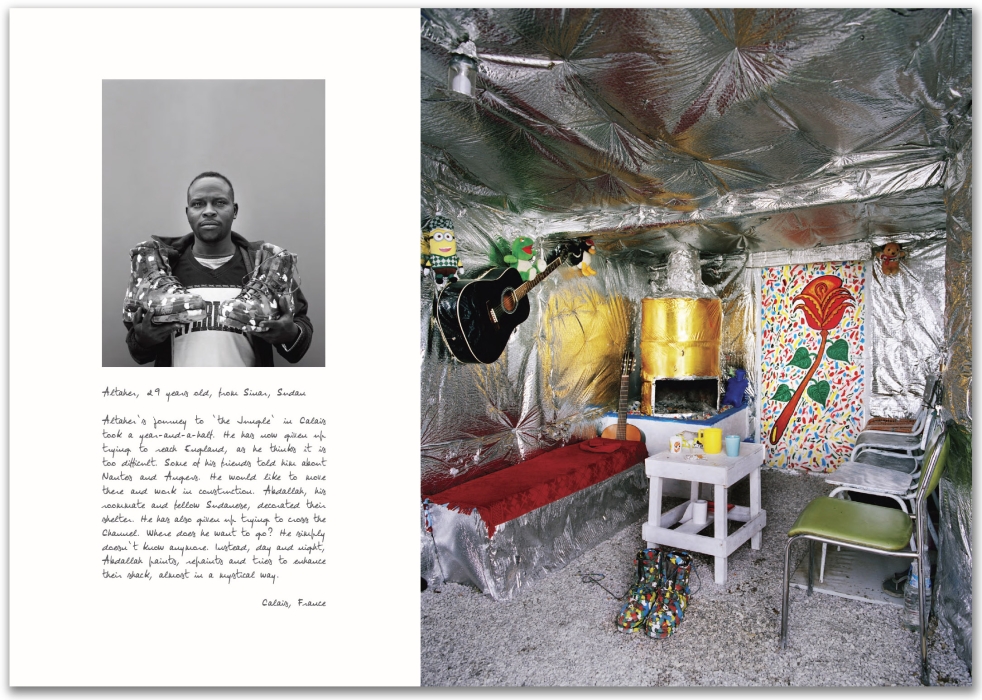
Altaher, 29 years old, from Sinar, Sudan
Altaher’s journey to ‘the Jungle’ in Calais took a year-and-a-half. He has now given up trying to reach England, as he thinks it is too difficult. Some of his friends told him about Nantes and Angers. He would like to move there and work in construction. Abdallah, his roommate and fellow Sudanese, decorated their shelter. He has also given up trying to cross the Channel. Where does he want to go? He simply doesn’t know anymore. Instead, day and night, Abdallah paints, repaints and tries to enhance their shack, almost in a mystical way.
Calais, France
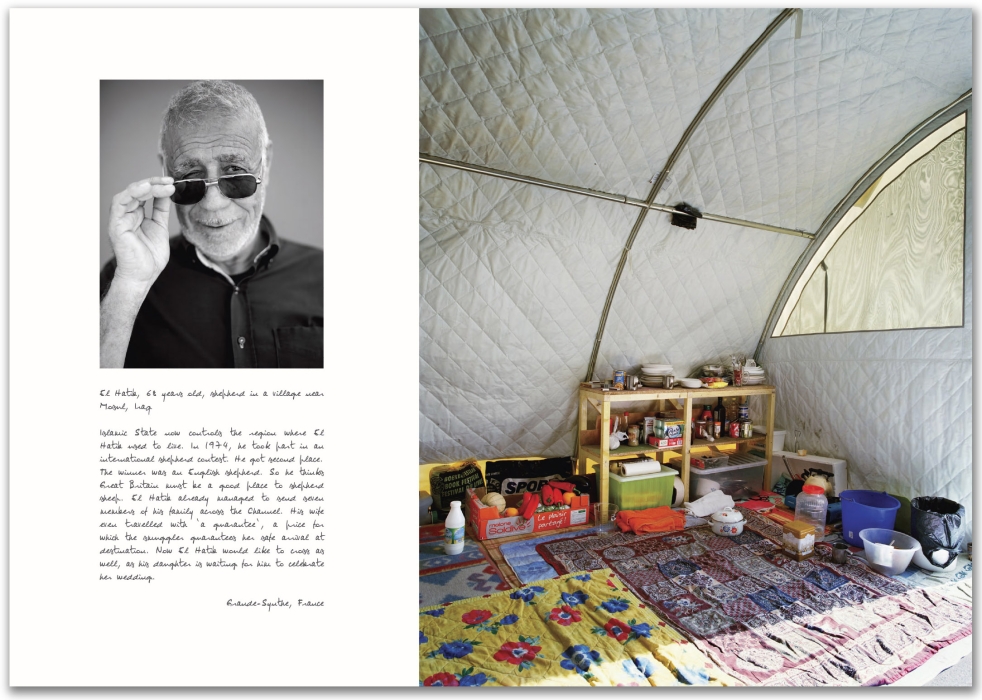
El Hatib, 68 years old, shepherd in a village near Mosul, Iraq
Islamic State now controls the region where El Hatib used to live. In 1974, he took part in an international shepherd contest. He got second place. The winner was an English shepherd. So he thinks Great Britain must be a good place to shepherd sheep. El Hatib already managed to send seven members of his family across the Channel. His wife even travelled with ‘a guarantee’, a price for which the smuggler guarantees her safe arrival at destination. Now El Hatib would like to cross as well, as his daughter is waiting for him to celebrate her wedding.
Grande-Synthe, France
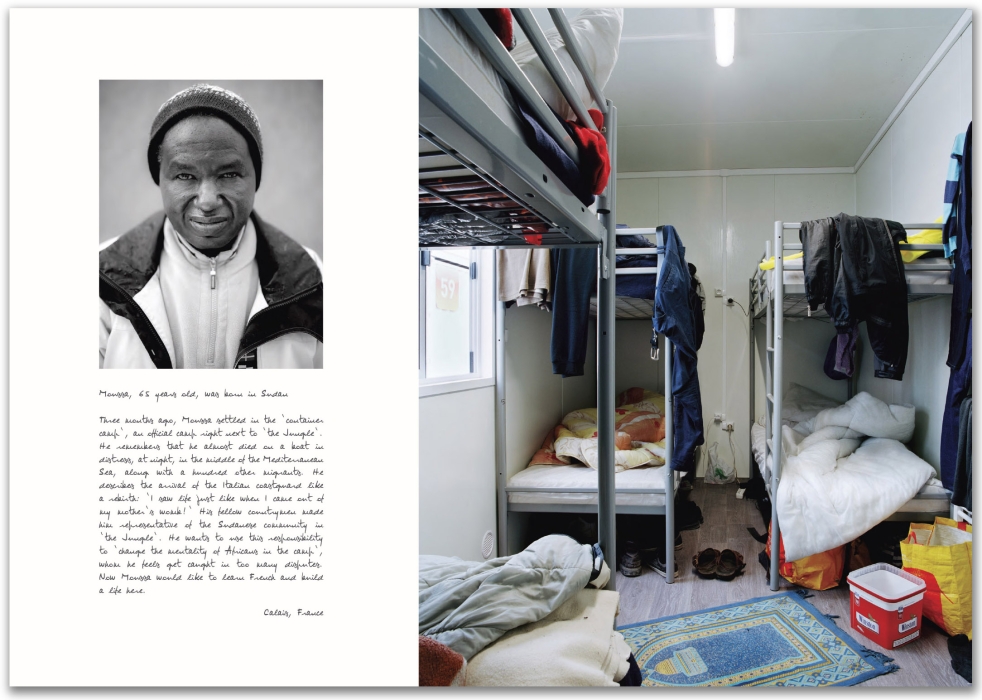
Moussa, 65 years old, was born in Sudan
Three months ago, Moussa settled in the ‘container camp’, an official camp right next to ‘the Jungle’. He remembers that he almost died on a boat in distress, at night, in the middle of the Mediterranean Sea, along with a hundred other migrants. He describes the arrival of the Italian coastguard like a rebirth: “I saw life just like when I came out of my mother’s womb!” His fellow countrymen made him representative of the Sudanese community in ‘the Jungle’. He wants to use this responsibility to “change the mentality of Africans in the camp”, whom he feels get caught in too many disputes. Now Moussa would like to learn French and build a life here.
Calais, France
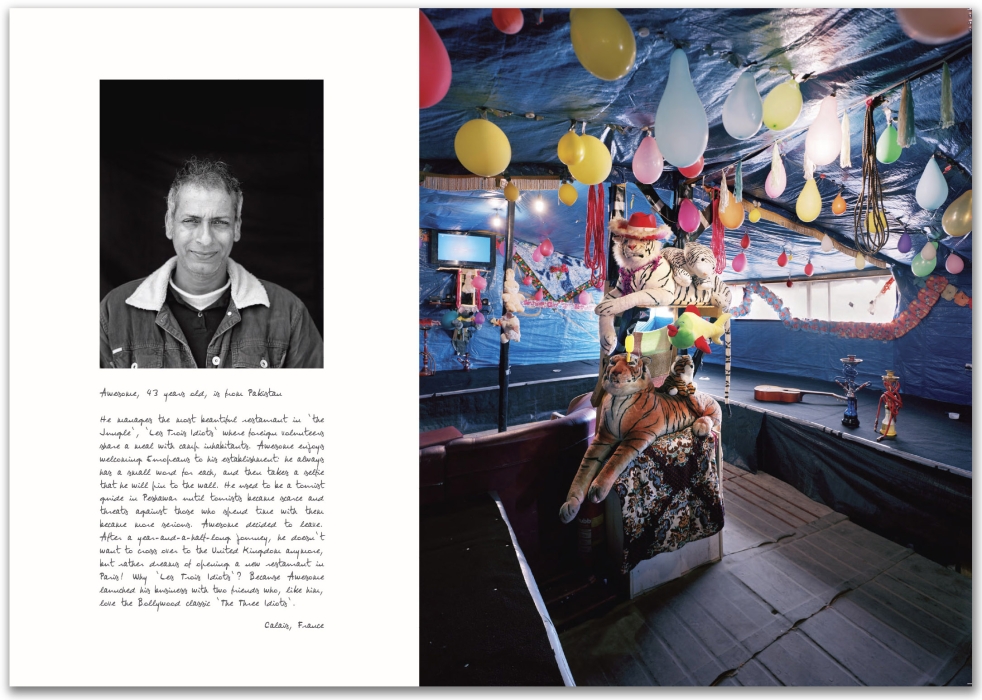
Awesome, 43 years old, is from Pakistan
He manages the most beautiful restaurant in ‘the Jungle’, ‘Les Trois Idiots’ where foreign volunteers share a meal with camp inhabitants. Awesome enjoys welcoming Europeans to his establishment: he always has a small word for each, and then takes a selfie that he will pin to the wall. He used to be a tourist guide in Peshawar until tourists became scarce and threats against those who spend time with them became more serious. Awesome decided to leave. After a year-and-a-half-long journey, he doesn’t want to cross over to the United Kingdom anymore, but rather dreams of opening a new restaurant in Paris! Why ‘Les Trois Idiots’? Because Awesome launched his business with two friends who, like him, love the Bollywood classic ‘The Three Idiots’.
Calais, France
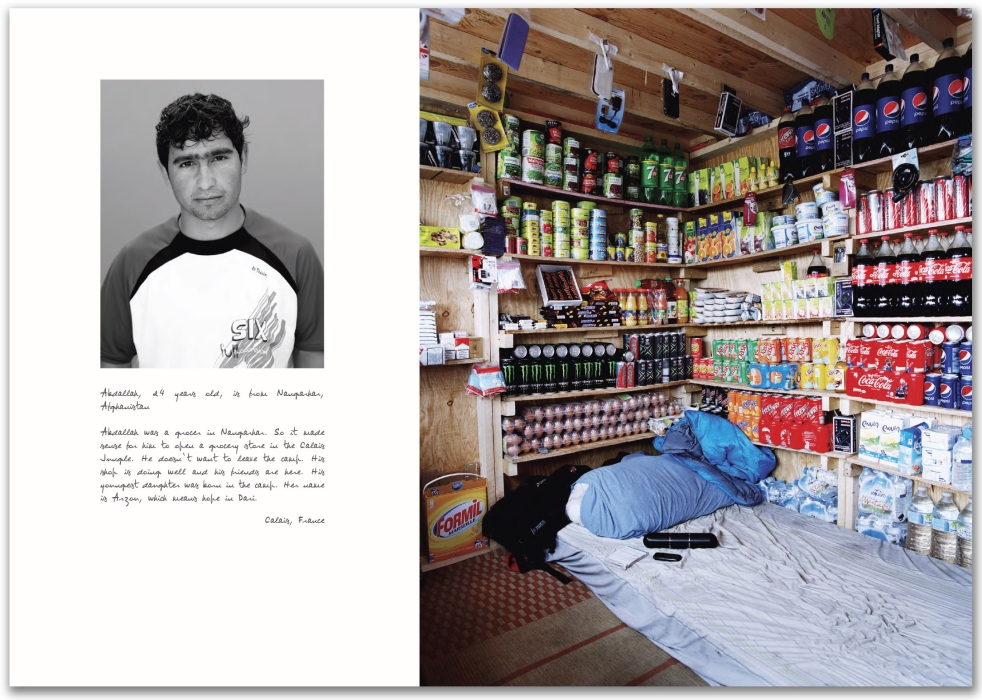
Abdallah, 24 years old, is from Nangarhar, Afghanistan
Abdallah was a grocer in Nangarhar. So it made sense for him to open a grocery store in the Calais Jungle. He doesn’t want to leave the camp. His shop is doing well and his friends are here. His youngest daughter was born in the camp. Her name is Arzou, which means hope in Dari.
Calais, France
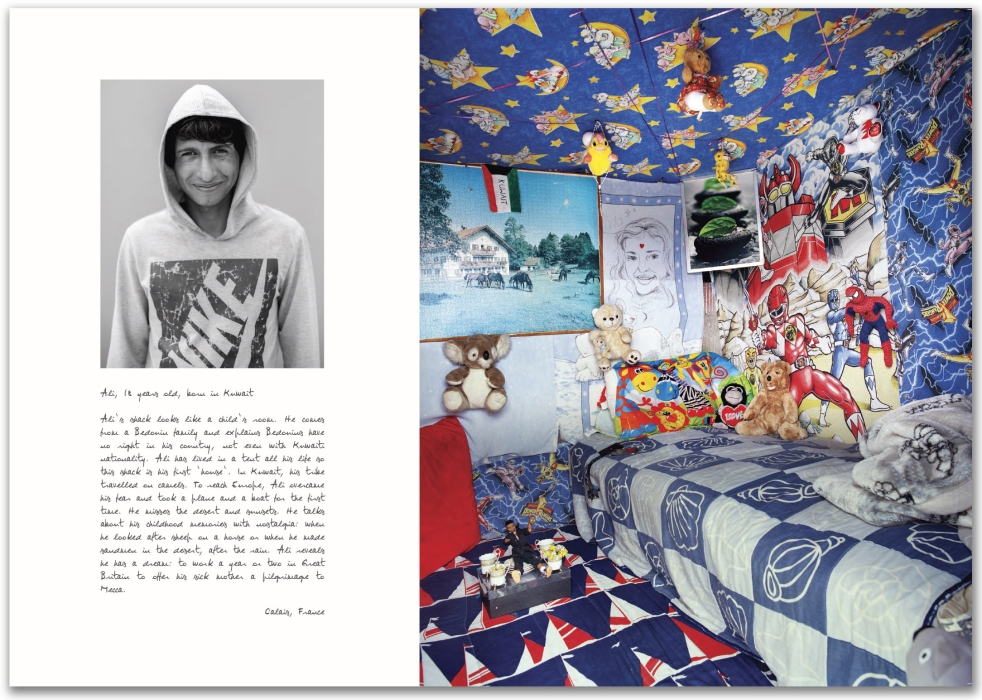
Ali, 18 years old, born in Kuwait
Ali’s shack looks like a child’s room. He comes from a Bedouin family and explains Bedouins have no right in his country, not even with Kuwaiti nationality. Ali has lived in a tent all his life so this shack is his first ‘house’. In Kuwait, his tribe travelled on camels. To reach Europe, Ali overcame his fear and took a plane and a boat for the first time. He misses the desert and sunsets. He talks about his childhood memories with nostalgia: when he looked after sheep on a horse or when he made sandmen in the desert, after the rain. Ali reveals he has a dream: to work a year or two in Great Britain to offer his sick mother a pilgrimage to Mecca.
Calais, France
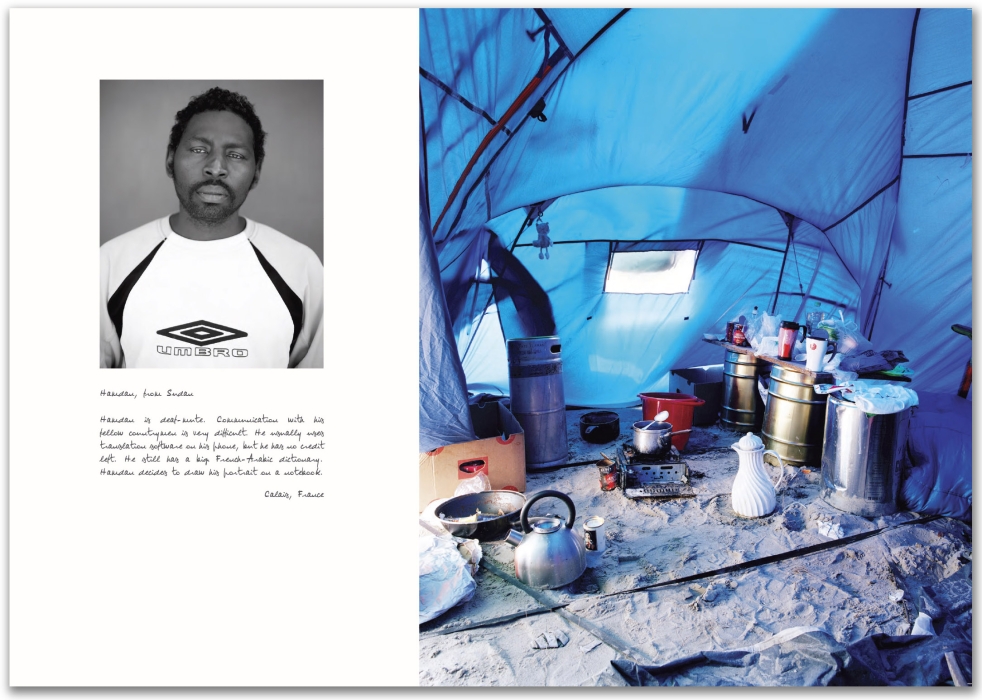
Hamdan, from Sudan
Hamdan is deaf-mute. Communication with his fellow countrymen is very difficult. He usually uses translation software on his phone, but he has no credit left. He still has a big French-Arabic dictionary. Hamdan decides to draw his portrait on a notebook.
Calais, France
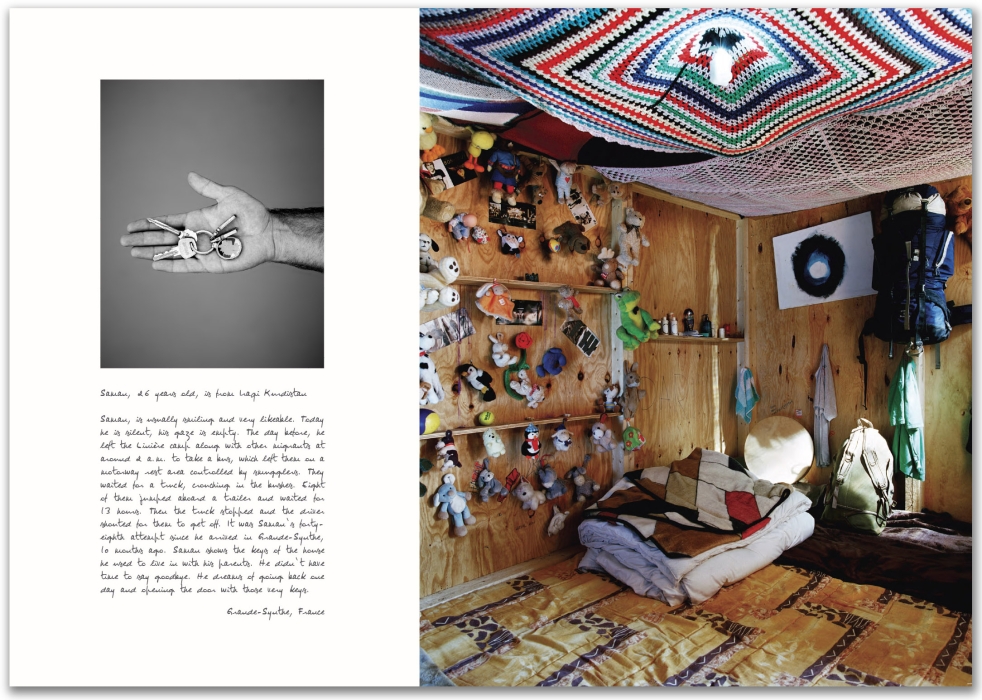
Saman, 26 years old, is from Iraqi Kurdistan
Saman, is usually smiling and very likeable. Today he is silent, his gaze is empty. The day before, he left the Linière camp along with other migrants at around 2 a.m. to take a bus, which left them on a motorway rest area controlled by smugglers. They waited for a truck, crouching in the bushes. Eight of them jumped aboard a trailer and waited for 13 hours. Then the truck stopped and the driver shouted for them to get off. It was Saman’s forty- eighth attempt since he arrived in Grande-Synthe, 10 months ago. Saman shows the keys of the house he used to live in with his parents. He didn’t have time to say goodbye. He dreams of going back one day and opening the door with those very keys.
Grande-Synthe, France
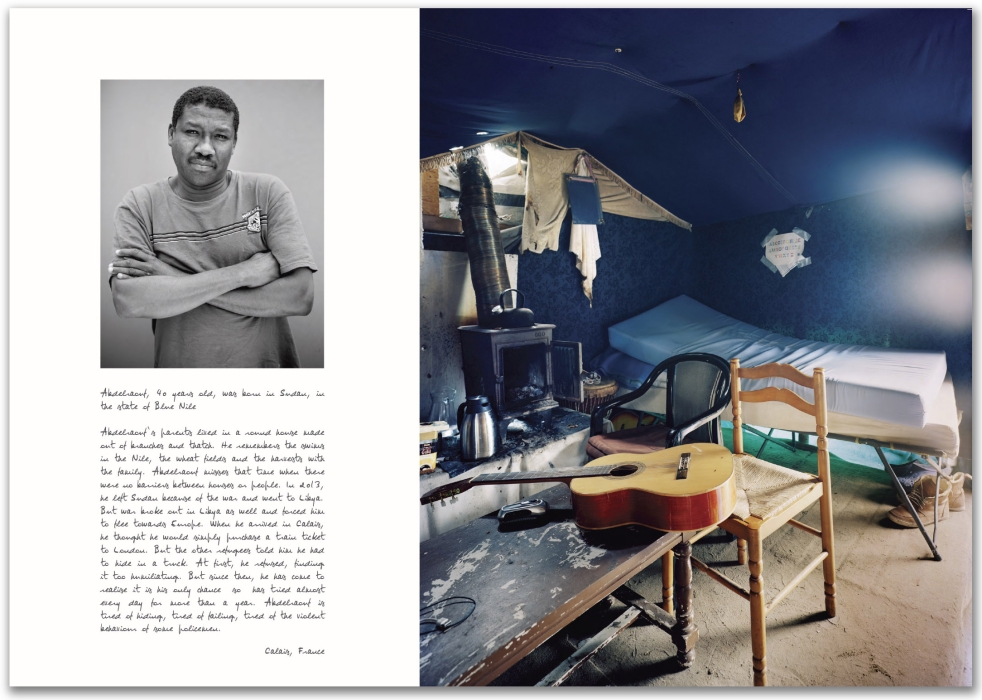
Abdelraouf, 40 years old, was born in Sudan, in the state of Blue Nile
Abdelraouf’s parents lived in a round house made out of branches and thatch. He remembers the swims in the Nile, the wheat fields and the harvests with the family. Abdelraouf misses that time when there were no barriers between houses or people. In 2013, he left Sudan because of the war and went to Libya. But war broke out in Libya as well and forced him to flee towards Europe. When he arrived in Calais, he thought he would simply purchase a train ticket to London. But the other refugees told him he had to hide in a truck. At first, he refused, finding it too humiliating. But since then, he has come to realise it is his only chance so has tried almost every day for more than a year. Abdelraouf is tired of hiding, tired of failing, tired of the violent behaviour of some policemen.
Calais, France
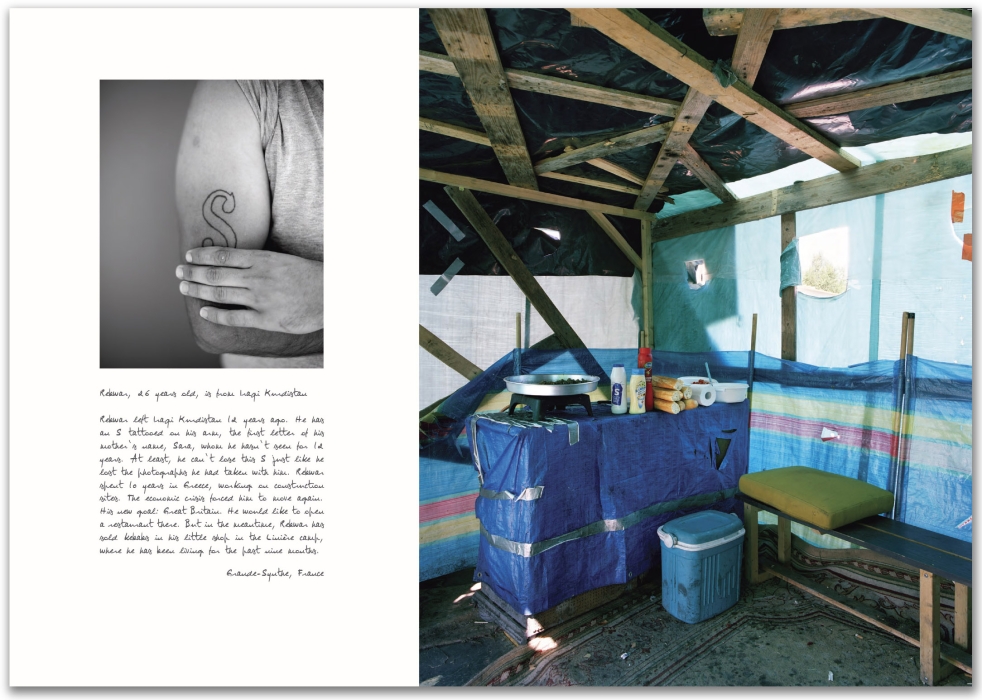
Rebwar, 26 years old, is from Iraqi Kurdistan
Rebwar left Iraqi Kurdistan 12 years ago. He has an S tattooed on his arm, the first letter of his mother’s name, Sara, whom he hasn’t seen for 12 years. At least, he can’t lose this S just like he lost the photographs he had taken with him. Rebwar spent 10 years in Greece, working on construction sites. The economic crisis forced him to move again. His new goal: Great Britain. He would like to open a restaurant there. But in the meantime, Rebwar has sold kebabs in his little shop in the Linière camp, where he has been living for the past nine months.
Grande-Synthe, France
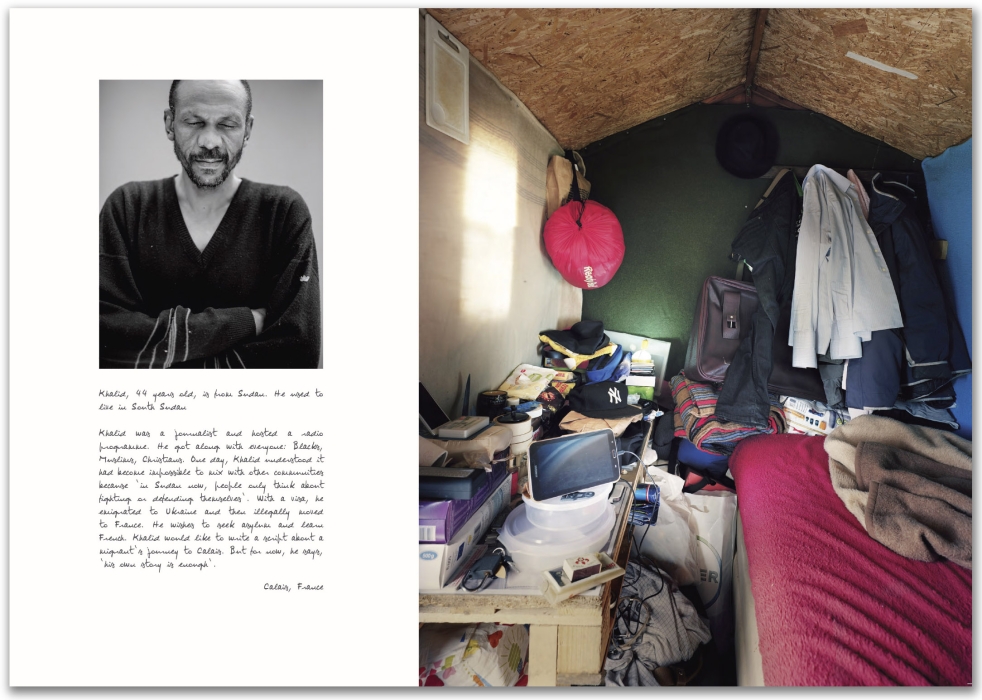
Khalid, 44 years old, is from Sudan. He used to live in South Sudan
Khalid was a journalist and hosted a radio programme. He got along with everyone: Blacks, Muslims, Christians. One day, Khalid understood it had become impossible to mix with other communities because “in Sudan now, people only think about fighting or defending themselves”. With a visa, he emigrated to Ukraine and then illegally moved to France. He wishes to seek asylum and learn French. Khalid would like to write a script about a migrant’s journey to Calais. But for now, he says, “his own story is enough”.
Calais, France
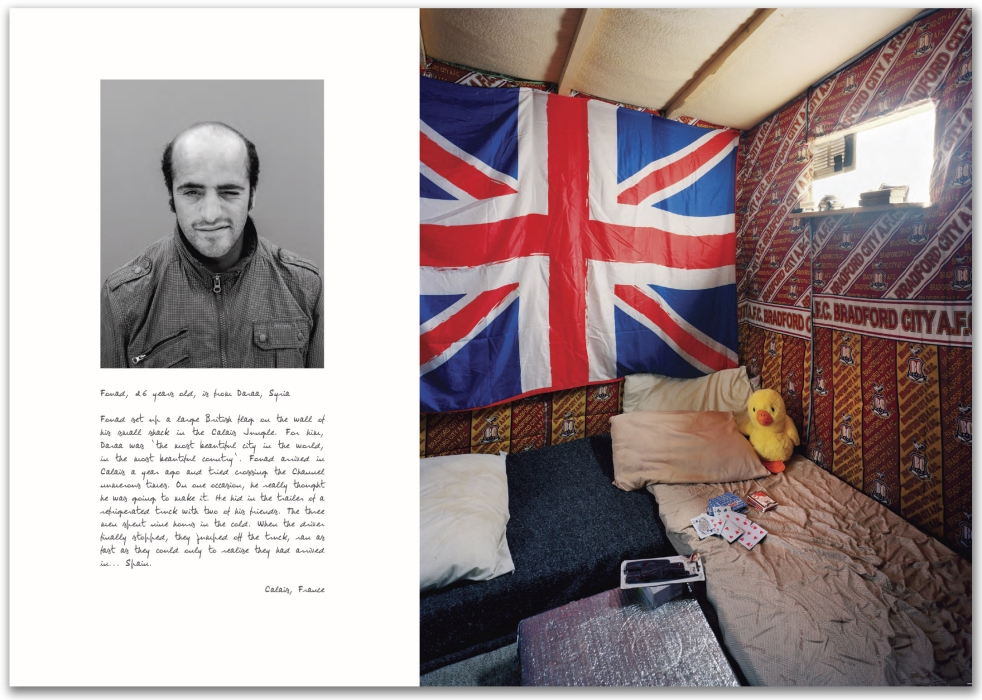
Fouad, 26 years old, is from Daraa, Syria
Fouad set up a large British flag on the wall of his small shack in the Calais Jungle. For him, Daraa was “the most beautiful city in the world, in the most beautiful country”. Fouad arrived in Calais a year ago and tried crossing the Channel numerous times. On one occasion, he really thought he was going to make it. He hid in the trailer of a refrigerated truck with two of his friends. The three men spent nine hours in the cold. When the driver finally stopped, they jumped off the truck, ran as fast as they could only to realise they had arrived in... Spain.
Calais, France
Prix 2016 de l'Académie de Beaux Arts
REFUGES / These images show the interior spaces of makeshift shelters in France and Greece in the refugees camps or in the "Jungle" in the town of Calais. These men and women have recreated a home, with souvenirs from their former life, objects that improve their everyday lives or express their most important dreams, like the Union Jack displayed on a shack wall in Calais. These images portray exile and migration. They tell us about these men and women who are searching for a better future, about their aspirations and personalities. Most of the makeshift accommodation photographed no longer exists, destroyed in particular during the Calais jungle eviction. Only these images remain, troubling proof of a brief stay, an important stage in singular lives.
Académie des Beaux-Arts Award 2016